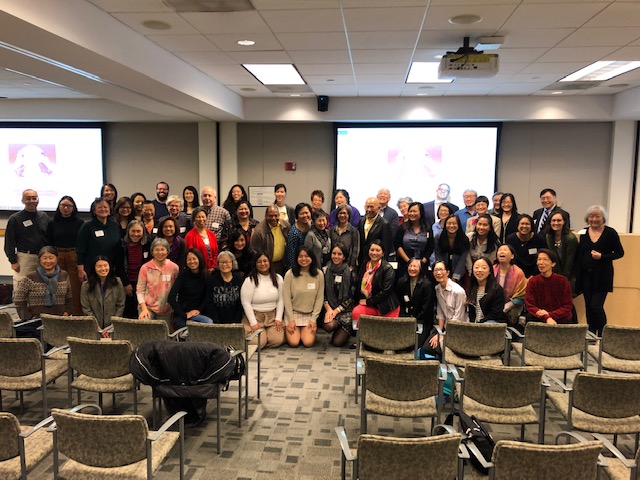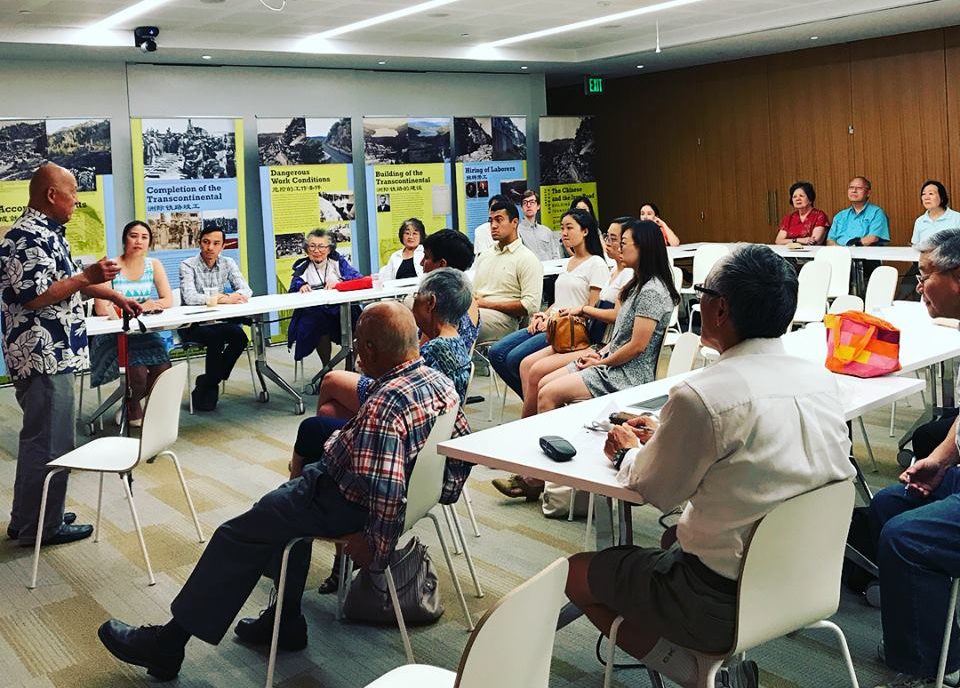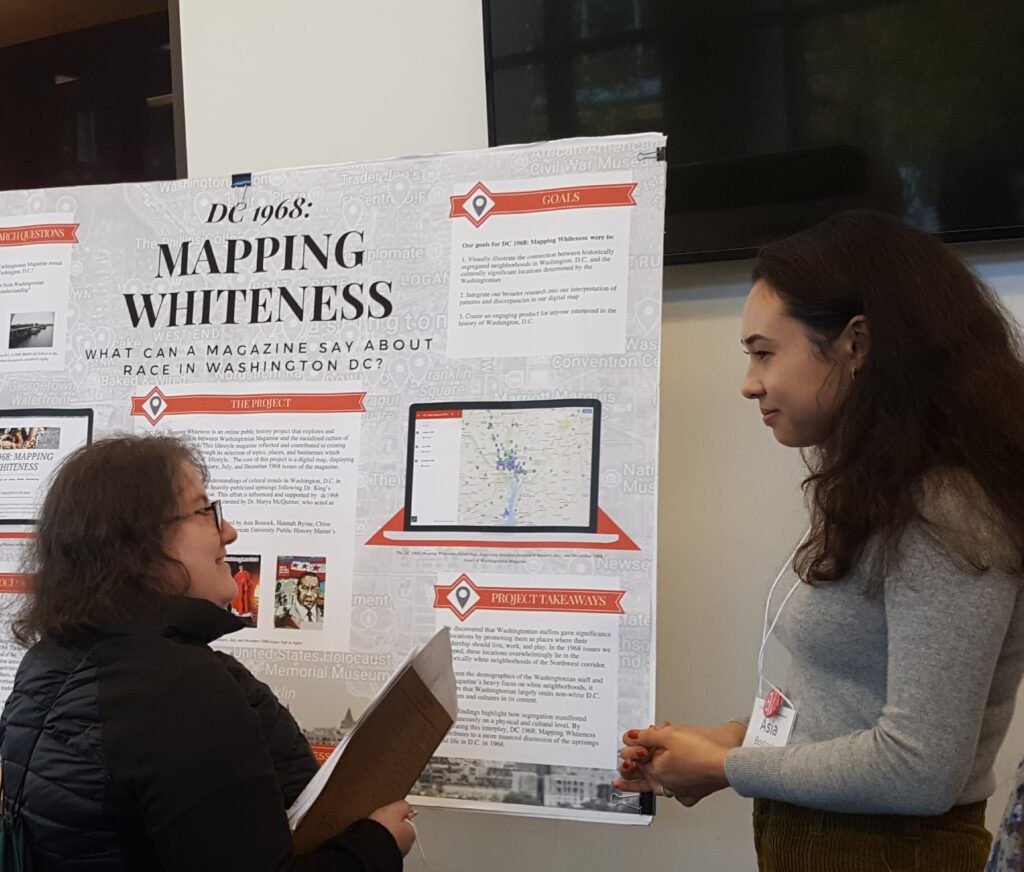


Partnerships in Collaboration: 1882 Symposium
As stories are revealed through Talk Story, and significance is explained by educators through lesson plans, the Foundation’s third initiative takes on the question of how to reach the general public effectively.
From its formation, the 1882 Project (now the 1882 Foundation as a 501(c)3 organization) has sought to establish a national network of private and public agencies collaborating to preserve and explain the history of the Chinese in America. Thus, with the Smithsonian Asian Pacific American Center, the 1882 Foundation hosted the 1882 Symposium in 2013 and 2014. In 2015, the Smithsonian Center for Folk Life and Cultural Heritage joined the third symposium around ideas to explore elements of a “digital platform” and visions of what can be done more effectively by working together than working alone.
Each symposium brings together museums and historical societies from around the country and public and private agencies based in DC* to discuss ways to sustain the educational effort. And, to encourage the growth of Asian American museums, the Foundation has provided scholarships for start-up programs in under-served areas to attend the symposiums.
The event allows museums, historical societies and private and public agencies to share best practices and strengthen collaborations. We envision the hub of the collaborative network crystalizing into a “National Chinatown Visitors and Talk Story Center” where interactive portals allow visitors to experience the richness of exhibits and programs of each museum and historical site throughout the United States.
The Foundation promotes traveling exhibits and digital museums. It seeks funding solutions and active dialogue on creative approaches to historical preservation. These approaches include working with Chambers of Commerce and efforts to amend the American Travel Promotion Act so that fees collected for marketing America to international tourists can be used for local historical preservation and program enhancements.
An illustration of collaboration at its best, the Foundation partnered with the Alexandria Black History Museum for a week of activities in September/October 2015 to commemorate the 50th anniversary of the 1965 Immigration and Nationality Act (Hart-Celler Act) and the Votng Rights Act. They were both parts of the Civil Rights Movement. The case of Gong Lum v. Rice in Mississippi foreshadowed Brown v. Board of Education by 30 years.
*Symposium participants have included the Chinese Historical Society of America and Angel Island Immigration Station Foundation from San Francisco, Chinese American Museum from Los Angeles, Museum of Chinese America from New York, Wing Luke Asian Museum from Seattle, Asian American Association of New Mexico, and the Mississippi Delta Chinese Heritage Museum, Library of Congress, National Archives and Records Administration, National Parks Service, Institute for Museum and Library Services, National Trust for Historic Preservation, US Citizenship and Immigration Service Historical Library, and U.S. Forest Service. Other participants include Association of Asians American Studies, Chinese American Citizens Alliance, Committee of 100, National Council of Chinese Americans and OCA-Asian American Advocates.
Talk Story and History Through Places
“Talk Story” is both process and concept. As concept, it draws from the Hawaii oral tradition and early Asian American Literature movement. Essentially, it is about revealing and recording oral histories and folk stories.
Undergirding this process is the idea that people coming together to share stories strengthens the community. The process allows individuals to define themselves in their own words to secure their own identities.
In DC, monthly Talk Story Events rotate among Chinatown venues to include the Chinatown Service Center, Chinese Consolidated Benevolent Association and Chinatown Community and Cultural Center. OCA and Chinese American Citizens Alliance strongly supported Talk Story events. At the OCA National Conference in 2013, a “Talk Story Corner” supported Story Corps from National Public Radio to record “conversations between generations.” The Chinese American Citizens Alliance built interest in oral histories and site preservation’s around the country through its promotion of Talk Story events and heritage tours. The tours are being planned with the US Forest Service and others. The Foundation participated in “Talk Story on the Mall” during the 2014 Smithsonian Folk Life Festival. We produced a film “April 1968″ as the first episode in a series of eight short documentaries “Through Chinatown’s Eyes.” The films seek to document the history of DC Chinatown through oral histories. They also explore themes familiar to other Chinatowns –relevant identity, pressing gentrification, evolving traditions–and the Chinese American experience.
Lesson Plans and Teacher Workshops
While Talk Story uncovers stories, educators explain their broader social and political context. Revising text books remains important as discussed at a conference in Sacramento, but the Foundation efforts have moved toward working with state governments on core standards and with local districts on lesson plans and teacher workshops.
Seattle educators developed lesson plans and presented them to the National council for Social Studies in Seattle and at a national C.A.C.A. convention in Oakland. Supported by the Foundation, educators presented at the Virginia Consortium of Social Studies Specialists and College Educators. Ideas focused on meeting state standards of learning through Chinese American historical examples and the 1882 Project. There was a follow up exhibit at the 2013 NCSS conference in St Louis. Virginia supporters presented at state and local conferences as well as approached state education officials. In Oregon and Washington state, supporters met with state legislators about the history and significance of Chinese Exclusion laws and curriculum content.
The Foundation’s efforts focus on 5-12 grade levels. We want to encourage new lesson plans while cataloguing existing plans to establish an on-line bank of teaching material. Another goal is to establish a national speakers bureau on Chinese American history and heritage.
